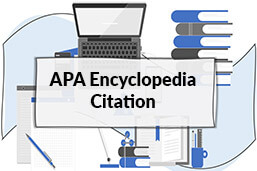
Academic research thrives on the inclusion of encyclopedias, and APA examples further elucidate how this can be achieved. When writing an academic essay and a research paper, utilizing the APA encyclopedia citation style can be especially valuable. This APA encyclopedia citation guide for encyclopedias not only offers a comprehensive explanation of what an encyclopedia is, but also contrasts it with other sources, complete with APA examples to illustrate the differences.
Definition: APA encyclopedia citation
Encyclopedias are reference works that aim to collect and organize all existing information on a certain field into a single volume. Here, the term “general knowledge” denotes the body of information about which experts may agree on a common level.
In addition, it serves as the jumping-off point for further discussion on the topic at hand. Common to APA encyclopedia citation is a systematic approach to the order of entries or themes based on criteria that reflect the editors’ understanding of the significance of various areas of knowledge.
When citing an article from an online encyclopedia, begin with the entry’s writer (if one is given). Then mention the year it was published, the topic, the Editor’s name, the description of the Encyclopedia, the edition, the publisher, and the URL as shown below:
| APA Format | Author's surname, initials. (Year). The title of the entry. In the Editor's initials. Last name (Ed.), the title of the Encyclopedia (Edition). Publisher. URL |
|
APA Reference Entry |
Kilter, G. (2019). Rounded gravity. In R. W. Malta (Ed.), Stanford encyclopedia of philosophy (Spring 2019 ed.). Stanford University. https://plato.stanford.edu/entries/rounded-gravity/ |
| APA in-text Citation | (Kilter, 2019) |
There are two primary categories of encyclopedias, general education and dictionaries, defined by how they organize their information.
- First, the subjects included in general education encyclopedias are often arranged in what can be called “natural” structures, such as the chronological order of a history encyclopedia.
- On the other hand, dictionary entries in APA encyclopedia citation are often organized by letter. Additionally, encyclopedias may be found in either digital or physical form.
Due to the constant nature of online APA encyclopedia citation updates, a definitive publication date is sometimes unavailable. The names of the writers and editors may also be omitted. In cases when a year cannot be determined, enter “n.d.” (no date) in the customary “author” slot and add the retrieval date after the fact. Be aware that there is a distinct APA encyclopedia citation format when referencing Wikipedia articles.
APA encyclopedia citation: A print encyclopedia
When referencing an APA encyclopedia citation in print, it is important to provide the edition number and publication year. If the publisher is previously mentioned in the “author” section, there is no need to repeat it. Include the author’s name first if it appears in the entry and the publisher’s name last.
| APA Format | Publisher Name. (Year). Entry name. In Editor initials. Last name (Ed.), Encyclopedia name (Edition, p. Page number). |
| APA Reference Entry | Oxford University Press. (2018). Aria. In R. M. Marvin (Ed.), The Oxford encyclopedia (p. 15). |
| APA In-Text Citation | (Oxford University Press, 2018) |
FAQs
References to articles in online encyclopedias should follow the APA format, which requires the name of the Editor, the name of the Encyclopedia, the edition number, the publisher’s name, and the URL.
APA encyclopedia citation may be used as primary sources depending on the depth of your investigation. One of the most well-known encyclopedias, the Encyclopedia Britannica, was initially published in 1768 but has only recently been recognized as a primary source by historians.
An APA encyclopedia citation is a reference guide that covers every area of study or research or addresses one area of study in great depth. They have provided readers with digestible summaries of relevant research for almost two millennia.
Each APA encyclopedia citation article you utilize in your paper has to be referenced properly. Wikipedia, the free online Encyclopedia, is a prime illustration of this resource. While all Wikipedia articles originate from the same source, you should reference each individually.
When someone knowingly steals the work of another without giving proper credit, they are plagiarizing. Plagiarism may take many forms, such as submitting a paper that was downloaded from the internet or a fraternity’s files or submitting an entire encyclopedia article or published essay as one’s own work.
